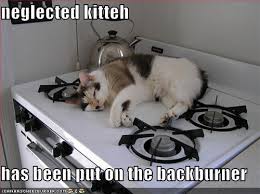Today is July 15, National Pet Fire Safety Day.
Many years ago I was spending Christmas day at my Aunt Beverly’s home. Beverly was a first-time cat owner and, as often happens to compassionate people, Puddy had recently wandered up to her home and moved in. The Russian Blue wannabe worked the crowd as Bev passed loaded plates to the dining room through a convenient service window. Faux fir boughs and a votive candle adorned the window ledge.
Assuming a supervisory position, Puddy lept up on the ledge and paused over the candle. Everyone in the room noticed the kitty straddling the flame. A chorus of, “Oh no!” and “Move Puddy” filled the air. With all the screaming and panic, Puddy didn’t move a whisker. Before anyone could grab him, his pewter fur began smoldering. More human hysteria, more freezing. Well-intentioned rescuers reached him; and chased the terrified cat around the house.
Fortunately, only his fur and his pride were singed. It could have been much worse: Puddy could have died a horrible death and the house could have caught fire.
That night I went home and threw out all of my candles. That Christmas day I learned: if pets can get into trouble, they will, a fact backed up by National Fire Protection Association statistics. The organization estimates that 1,000 house fires are started annually by pets.
Since today is National Pet Fire Safety Day, I thought I’d share some suggestions for keeping your
pets safe in the event of a fire.
Be prepared and include your pets in your family fire evacuation plan.
When you hold family fire drills (and if you don’t, you should) or practice escape routes, do it with your pets. Keep leashes and carriers in a handy place. (Don’t try to carry your dog or cat in your arms. A panicky pet could injure you or wiggle out of your gasp and become lost.)
- Place a Pet Alert sticker on a front window or door and keep the information current. Update it whenever you get a new pet or say goodbye to a companion.
- Use flameless candles. (Remember Puddy.)
- Don’t leave your pets unattended around an open flames. Extinguish candles, stoves and fireplaces before leaving home.
- Pet proof your home. Can the puppy or kitten chew computer wires? If you have cats, consider fire hazards in 3-D.
- Keep young pets confined when you are away from home.
- Get a stove knob shield or remove the knobs when you aren’t around. (You can get the stove guards in the baby section of any store including Lowes.) This is where most pet-associated fires begin.












Recent Comments